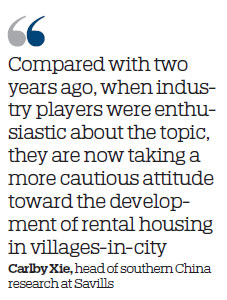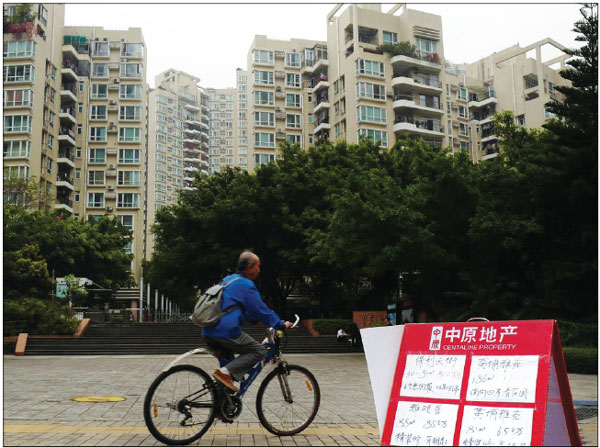Shenzhen's plan to boost rental housing thwarted
Updated: 2019-08-16 06:58
By Zhou Mo in Shenzhen(HK Edition)
|
|||||||
Two years ago, Shenzhen's real-estate speculators frenetically tried to cash in on the 'villages-in-city', but now their zeal has dampened considerably due various factors, including high renovation costs, a low return rate, long-standing land shortage and poor regulation.
As it grew from a small fishing village into a modern metropolis, Shenzhen saw hundreds of villages emerging inside the city itself in its nearly four decades of development.
The so-called villages-in-city have been a major source of housing for migrants because of the relatively low prices of the homes. These homes form a large part of the city's rental housing market.
Since the Shenzhen government made it a priority in 2017 to develop rental housing as a solution to the city's skyrocketing home prices, some property enterprises have set their sights on the millions of units in the villages-in-city, believing it would be a lucrative business.
But after two years, they have come to realize it's not as easy as what they had thought initially, and they have begun to adjust their strategies accordingly.
The market situation was thrust under the spotlight recently after reports that real-estate developer Vanke was negotiating with some landlords in Shenzhen's villages-in-city over compensation that Vanke will pay for its rental defaults there.
Change tactics
Vanke decided to quit some of the apartments it rented from the homeowners, which the mainland developer had previously planned to renovate and then rent out.
The project is part of Vanke's broader drive to explore Shenzhen's rental market, which the city is trying to develop as a solution to the city's skyrocketing home prices.
In response to media queries on the issue, Vanke said it had met with some difficulties in the process and planned to adjust and optimize the structure of its housing resources. It didn't specify what difficulties it had met.
Industry experts and market analysts said the high cost of renovation, the low return rate, conflicts with tenants, and the lack of a regulatory system are factors that are discouraging property enterprises from the business.
"Compared with two years ago, when industry players were enthusiastic about the topic, they are now taking a more-cautious attitude toward the development of rental housing in villages-in-city," said Carlby Xie, head of southern China research at international real estate service provider Savills.
Real-estate enterprises were given government subsidies to develop the market, but at the same time they had to meet other government requirements, he said.
"Enterprises had no idea of how the situation would be when they first started. After these two years of operation, some disadvantages have begun to emerge, and some businesses have come to realize that it is not a profitable business."
According to media reports, Vanke said that due to the high renovation cost of rooms in villages-in-city, it could begin to make profits from them only after eight years of operation. Tenancy term for the houses normally goes to 12 years or longer.
The company had to acquire the rooms from landlords at above-market prices and promise a certain growth rate each year because of the unpredictability of the market in the long term.
Complex rental market
The low rate of return is also a problem. The financing rate for long-term rental business is normally above 5 percent, but the return rate for long-term rental apartments is only 1 to 3 percent, and below 2 percent in first-tier cities.
When the units come into the market again after renovation, they have a higher rental price, which increases the financial burden on tenants.
The housing shortage has long been an acute problem in Shenzhen. The southern metropolis, with an area of less than 2,000 square kilometers, is only one-eighth the size of Beijing and one-fourth that of nearby Guangzhou. Land for housing development is very limited.

Meanwhile, Shenzhen's population has kept growing every year. According to government statistics, the city's population surged by about 620,000 in 2017 compared with the previous year. Many newcomers are young people who want to buy a home.
The imbalance of supply and demand is considered a key reason why Shenzhen's home prices have seen considerable growth in the past few years.
Counteracting measures
The Shenzhen government has introduced various measures to ease the problem, such as increasing the number of rental homes in the city. The aim is to divert part of the buying demand to the rental side.
In a guideline launched in August 2017, the government said no fewer than 1 million units of homes and rooms in Shenzhen's villages-in-city should be developed or renovated for renting by 2020.
A number of property enterprises have flocked in, eager to get a slice of the pie in a market that they believe has high potential of growth.
It is reported that Vanke had acquired 100,000 rooms in about 60 villages-in-city as of March.
Song Ding, director of the Tourism and Real Estate Industry Research Center at the Shenzhen-based think tank China Development Institute, said despite the challenges facing the industry, the overall direction of developing the rental housing market should be maintained.
"The government needs to do more in terms of policymaking. It should establish a comprehensive, detailed and authoritative policy system for guiding its development. Strengthened management regulations should be set up to keep rental prices at a reasonable level, said Song."
According to Centaline Property Agency, average rental prices for residential properties in Shenzhen stood at 71.4 yuan ($10.30) per square meter per month in June, - down 0.02 percent compared with a month earlier.
sally@chinadailyhk.com
|
A man on a bike rides past an estate housing cluster in Shenzhen. More and more property enterprises in recent years have come to realize that rental housing business is not as lucrative as they expected in the first place. Edmond Tang / China Daily |
(HK Edition 08/16/2019 page9)
